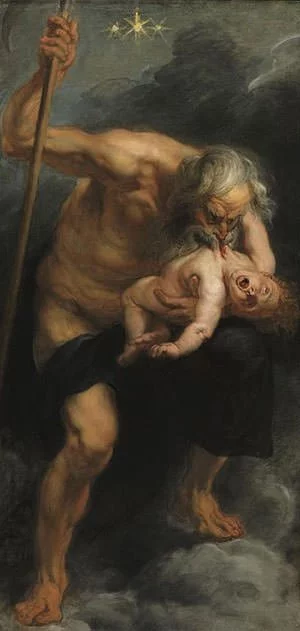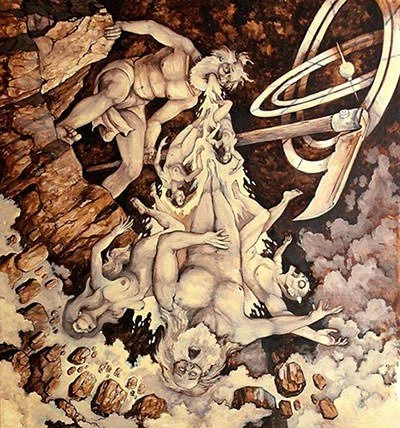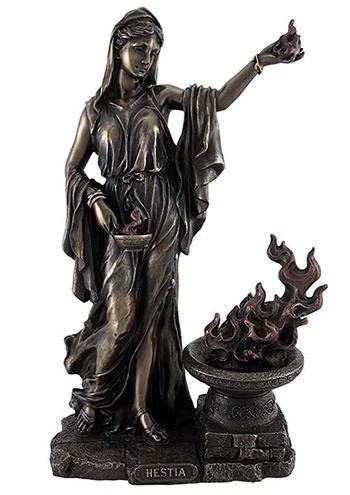Noted among the 12 Olympians in Greek mythology, Hestia (Vesta in Roman myths) is the Goddess of the hearth, home, domestic life and hospitality. Hestia was the firstborn child of the Titans Cronus and Rhea, and was a sibling of the Greek supreme God Zeus. She was a gentle, stable, serene, forgiving and dignified virgin Goddess who is bound by her domestic duties at mount Olympus. As such, Hestia is absent from the scandalous and adventurous myths surrounding the other Greek Gods and Goddesses. In her few depictions, she is usually depicted as a modest middle-aged veil clad woman, sometimes standing by a large fire or carrying a staff. Despite featuring in few myths, Hestia was among the most revered and influential Goddesses among the people of ancient Greece because she was the Goddess of the household. She customarily received the first offerings in the ceremonies of the household such as marriage, birth, arrival of brides and of slaves. Hestia means hearth (fire place) and the Goddess personified the sacredness and importance of the element. Beyond the household, Hestia had a dedicated civic hearth in the town or city’s Prytaneion, a place where the executive met and from where the government was run. The fire in these city centers was always kept alive, and as per ritual, new settlers carried a flame from these places to propagate the sacred fire in their new towns. Know more about Hestia through these 5 most famous myths featuring her.
#1 Cronus And Rhea
In Greek mythology, Cronus or Kronos was the youngest of the first generation of Titans born out of Uranus (the sky) and Gaia (the earth). Cronus grew up to overthrow his divine father and taking his elder sister Rhea as wife, they ruled over what is known as the Golden Age. Cursed to meet the same fate as his father, Cronus became very insecure about his yet to be born children. Hestia was the first born child of Cronus and Rhea. She was swallowed by her father Cronus who was afraid that his children might one day rise up against his authority, and thus fulfill the prophesy of his father Uranus.

#2 The First And The Last
Hestia is often referred as the “first and the last” Goddess. According to Greek myths Hestia was the eldest child of Cronus and Rhea, and was the first to be devoured by her father Cronus. The same fate befell on her other siblings Demeter, Hades, Poseidon and Hera, but the youngest of them Zeus was saved by their mother Rhea. When Zeus grew into manhood he was determined to restore his brothers and sisters. He was assisted in this difficult task by the Metis (Goddess of wisdom, thought and skill), who artfully persuaded Cronus to drink a potion, causing him to emit out what he had swallowed. The disgorged children were hence reborn again in reverse order, and Hestia who was emitted out last was now the youngest child. In this way Hestia was the first and the last of the Gods (or Goddesses), born from the Titans Cronus and Rhea.

#3 Vow of Chastity
As Hestia grew in grace and beauty she soon caught the eye of Poseidon (God of sea and storm) and Appolo (God of war), and both the Gods sought her hand in marriage. But Hestia refused both of them firmly and took a vow of eternal virginity by placing her hand on Zeus’ (King of Olympians) head. The vow ended the tensions between the suitors and so impressed Zeus that he granted her the central place in the house, a share in worship in all the temples and the first portion of humans’ divine offerings.
#4 Hestia And Priapus
Priapus was a minor god associated with fertility and lust. He was seen as a protector of life stock, fruits and the male sexual organ. According to a story, the mother Goddess Rhea, once hosted a celebration of the Olympians’ victory over the Titans. A disinterested Hestia wandered away from the festivities and fell asleep in the woods. She was found here by a drunk Priapus, who was about to rape the virgin Goddess. However, Hestia was warned by a braying donkey in time and woke up from her slumber. The other Olympians soon arrived on the scene and confronted Priapus forbidding him from ever joining in their celebrations again. Ever since, donkeys were rested and garlanded on Hestia’s feast-day.

#5 Hestia And Dionysus
In Greek mythology Dionysus is the God of grape harvest, wine, orchards and festivity. According to popular myth, he is the son of Zeus (king of the Gods) with Persephone (queen of the Underworld), or with a mortal woman named Semele. In certain places the name of Dionysus replaces Hestia as the 12th Olympian. Some stories say that when the young God Dionysus came to live in heaven, the modest and introverted Hestia stepped down in his favor. However, there is no ancient source to verify this claim.


What are the sources?